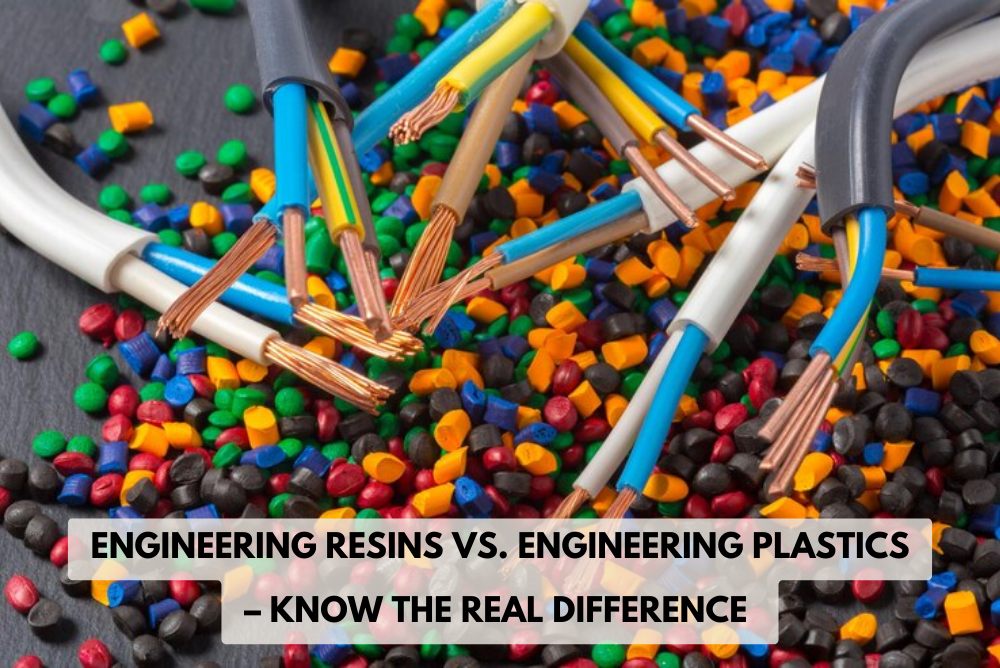The choice of materials used in the modern manufacturing holds immense significance. This is because it determines the success and performance of the engineered products based on their core or modified physical and chemical properties. Among the many available materials, engineering resins, and plastics are the most popular, each offering unique advantages and applications. Although both the terms may sound similar, there are differences between them. Would you like to know how these two are different from each other? This post highlights the differentiating factors between these two.

Differentiating Factors Between Engineering Resins and Engineering Plastics
Many of us think these two are the same terms. However, they are not. Several factors differentiate engineering resins and plastics. Here are some important ones.
- Chemical Structure: Compared to engineering plastics, engineering resins have complex molecular structures resulting from precise chemical reactions during synthesis. This complexity enhances mechanical properties, chemical resistance, and thermal stability. Conversely, engineering plastics have simpler polymer structures; thus, they may perform differently than engineering resins. However, they can offer a good balance of properties for various applications.
- Thermal Stability: Engineering resins offer excellent heat resistance and dimensional stability over a wide temperature range. They can withstand varied temperatures without compromising quality, making them suitable for applications that involve exposure to heat or thermal cycling. Engineering plastics have lower heat resistance compared to engineering resins. However, they perform well within medium or standard operating temperatures.
- Mechanical Properties: Engineering resins have superior mechanical strength, toughness, and stiffness. Therefore, they are preferred for applications requiring exceptional performance under high-stress or load-bearing conditions. On the other hand, engineering plastics offer moderate to high mechanical properties and are suitable for many engineering applications.
- Processing Methods: Engineering resins are processed using different techniques, such as injection molding, compression molding, and extrusion. These processes preserve their dimensional accuracy and properties. Engineering plastics can be processed using injection molding, thermoforming, and blow molding. They are well-suited for high-volume production of complex shapes.
- Chemical Resistance: Resins have superior resistance to solvents, chemicals, and harsh environments owing to their tightly bound molecular structures. Therefore, they are ideal for applications where there is chemical or oil exposure, such as in aerospace, automotive, and chemical processing industries. Engineering plastics may not withstand highly corrosive or aggressive chemicals. They are preferred in applications where moderate chemical resistance is required.
- Cost: Engineering resins are more expensive than engineering plastics. This is owing to their excellent performance and specialized production processes. The cost effectiveness of engineering plastics makes them suitable for a broader range of applications where performance requirements are less stringent, operating environments are moderate, and cost is a significant factor.
- Applications: Engineering resins such as Nylon, PPS, and PEEK are ideal for high-performance applications where exceptional mechanical properties and thermal stability are paramount. Aerospace components, medical implants, automotive under-the-hood parts, and electronic enclosures are some popular examples. Engineering plastics such as ABS, PC, and PET are well-suited for consumer electronics, automotive interiors, household appliances, and packaging materials. These applications demand a balance of performance, affordability, and aesthetics.
By knowing the difference between engineering plastics and engineering resins, engineers and designers can optimize product designs for performance, durability, and cost effectiveness. If your next industrial or commercial application requires either of these two, you must source them from reliable and experienced plastic resin resellers or brokers. Mid Continent Plastics is well-known engineering plastics and resin supplier. The company offers engineering resins and plastics in different grades and quantities to meet the challenging demands of applications. The experts at the company can also help you with the selection process. Contact us to discuss your requirements today.